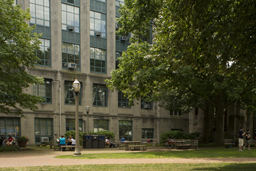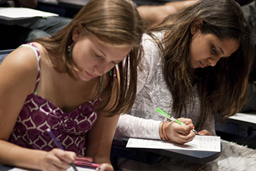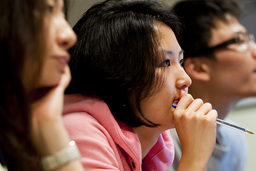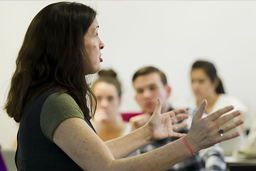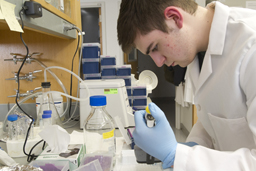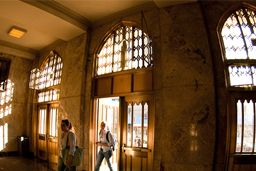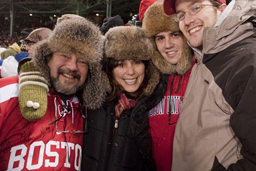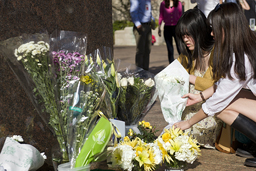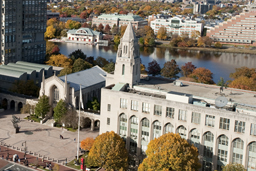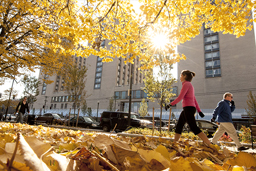The College recognized three outstanding faculty advisors, naming Assistant Professor of Earth & Environment Paul Hall, Professor of Economics Randy Ellis, and Assistant Professor of Psychology Amanda Turullo winners of the 2013 Templeton Award for Excellence in Student Advising. Read more in Raising the Quality of Undergraduate Education: Enriching the Curriculum. Each year, College of Arts & Sciences faculty work hard to improve the curriculum and courses. They are also eager to go beyond traditional “chalk and talk” approaches to teaching and learning to bring new modes of discovery and experiential learning to their students. One of the advantages of our location is that the Boston area offers so many opportunities for faculty to enrich the curriculum by breaking down the traditional walls of the classroom.
For faculty members, it is time-consuming to identify and make the appropriate arrangements to use the “living laboratory” of our region for pedagogical purposes, but they find the satisfaction of stretching their students’ academic experiences worth their personal investment. These academic enhancements also cost money. Fortunately, thanks to annual fund gifts from alumni, parents, and other friends of CAS, CAS has been able to establish and grow an Academic Enhancement Fund (AEF) to which faculty can apply to integrate valuable experiences into their courses. This past year, more professors than ever before took advantage of these funds to offer experiences to their students such as class trips to cultural performances, guided visits to local exhibits and institutions, and encounters—both formal and informal—with distinguished visiting scholars. In some cases, students themselves played an active role in designing and carrying out these enriching experiences.
AEF funds stretched the curriculum in more than 60 courses across a broad range of disciplines. Notable examples include Jenny White’s Urban Anthropology class, which toured the Mt. Auburn Cemetery, and Nazli Kibria’s Sociology of International Immigration seminar, in which students visited ethnic businesses in Dorchester. The AEF made it possible for students to attend acclaimed theatrical productions, from An Iliad to The Glass Menagerie, to the parody Mildred Fierce (in Sarah Frederick’s course on Melodrama in World Literature). AEF-sponsored visitors included Mexican novelists Jorge Volpi and Pedro Ángel Palou in Adela Pineda’s course on Latin American Literature and Culture. Students in Cynthia Becker’s Art in the African Diaspora course met Marie Maude Evans, a real Haitian Priestess of Vodou. Venturing beyond Boston, the AEF made it possible for diplomatic relations students to visit the UN in New York City and see that institution from the unique perspective of their CAS professor, former Pakistan Ambassador to the United States Husain Haqqani.
CAS has expanded learning opportunities for the most academically motivated students by providing a new and expanding program of Honors in the Major. Founded the previous year, CAS Honors in the Major came into its own in 2012/2013 as all CAS departments have now founded such programs. The Honors in the Major program allows qualified CAS students to pursue a course of study leading to graduation with honors in their major or minor. CAS students are also well-represented in Kilachand Honors College, and CAS and Kilachand Honors College this year completed the organization of a special and robust advising system for CAS students enrolled in Kilachand Honors College.
Of course, CAS does not “go it alone” in providing a first-rate curriculum to its students. CAS students benefit by collaborations with other BU schools and colleges to combine fields of learning in new, innovative ways. A new sustainable energy minor involves a three-way collaboration with the CAS Department of Earth & Environment, the School of Management, and the College of Engineering. A new minor in medical anthropology allows CAS students to take advanced courses in graduate medical sciences at BU’s School of Medicine. (See Appendix, Table 3. New Courses.) These are only some of the many examples of cross-disciplinary learning at CAS.

